#gender ambiguity
Explore tagged Tumblr posts
Text
[ant] kite’s gender ambiguity (a grown man whose soul was transferred into a young girl’s body) while having a very pretty/cute & feminine appearance/character design is smth that i deeply envy.




like, look at him 😭 literally so pretty. too pretty. genuinely one of the prettiest hxh designs i’ve ever seen.
the eng dub voice is also super pretty to me too, it’s composed & smooth, and matches his sub voice perfectly if not better imo.
#hxh#hunter x hunter#hunterxhunter#kite#hxh kite#chimera ant kite#ant kite#hxh chimera ant kite#hxh ant kite#chimera ant arc#election arc#character appreciation#character design#hxh kaito#kaito#hxh ant kaito#hxh chimera ant kaito#gender envy#gender#gender ambiguous#gender ambiguity#gender ambiguous character
23 notes
·
View notes
Text
I am going to be so normal about operation mincemeat now that I have seen it live
#it is the perfect balance of batshit crazy silly and beautiful solemn moments#dear bill had me bawling#GENDER AMBIGUITY#I will not be shutting up any time soon#theatre#musical theatre#operation mincemeat#west end#mine
10 notes
·
View notes
Text
Mukhannath
Mukhannath/مخنثون (plural: Mukhannathun) was a gender & sexual-diverse community of Pre-Islamic & Classical Islamic Societies. Transgender & gender variant identities & practices are diverse and vary across different cultures and societies, including within Muslim communities. In Classical Arabia, these people were refer to as 1.)Effeminate men, 2.) people of ambiguous sexual characteristics and gender non-confirmity, who appeared as more feminine, 3.) who socially had roles typically played by women. There is no monolithic interpretation or understanding of gender identity or expression within Islam, as the religion encompasses a wide range of beliefs and cultural contexts. The existence of mukhannathun has been acknowledged in many historical islamic texts, and their status within Islamic society has been subject to varying interpretations.
Etymology
According to the lexicographers, the term mukhannath derived from the verb Kha-na-tha in the first form means to fold back the mouth of a waterskin for drinking. Derived term develop the basic idea of bending or folding in the direction of pliability,suppleness,languidness,tenderness& delicacy.
According to 9th century Arabic scholar, philologist Abn Ubayd mukhannathun were so called on their account of effeminacy (takassur, elsewhere usually paired with tathanni,suppleness).[citation needed]
Later lexicographers define the term mukhannath as a man who resembles or imitates as woman in the languidness of his limbs or the softness of his voice.This definition rose to prominence among Islamic scholars until medieval times, when the term became associated with passive homosexuality.
While the term "Mukhannath al-Jins" has been used to refer to individuals who do not conform to traditional gender norms associated with their assigned sex.
History
Pre-Islamic Arab Society:
Mukhannathun's gender expression & existence were much tolerated in Pre-Islamic Arab world.Mukhannathun from the city of Medina (Saudi Arabia), are frequently mentioned in the hadith literature & in the works of many Early Arabic and Islamic writers.Mukhannaths were used as domestic worker,domestic helper,hairdresser in the early days of Islam.Mukhannath were allowed to access in both male & female quarters.Al-'Ayni quotes from al-Tabarani that in the days of the Prophet Muhammad,the mukhannathun spoke languidly,dyed their hands and feet (with henna), but were not accused of immoral acts (fahisha).
In the Rashidun and Umayyad caliphates, various mukhannathun of Medina established themselves as celebrated entertainers,artists.One particularly prominent mukhannath, Abū ʿAbd al-Munʿim ʿĪsā ibn ʿAbd Allāh al-Dhāʾib, who had the Arabic name Ṭuwais ("Little Peacock"), was born in Medina on the day Prophet Muhammad died (8 June 632).
Ṭuwais is described as the first mukhannath person to perform "perfect singing" characterized by definitive rhythmic patterns in Medina.He was also known for his sharp wit and his skill with the tambourine (which had previously been associated only with female musicians).No sources describe his sexuality as immoral or imply that he was attracted to men.But it is reported that he was married with a woman.
While Ṭuwais is typically described as the leading mukhannath musician of Medina during his lifetime.Another Mukhannath who was known by the name al-Dalāl ("the Coquettish") is mentioned as one of Ṭuwais's favorite pupils.He is portrayed as a witty but sometimes crude man who "loved women," but did not have sex with them.Unlike Ṭuwais, some tales involving al-Dalāl do suggest that he was attracted to men.Furthermore Ṭuwais and other mukhannathun musicians formed an intermediary stage in the social class most associated with musical performance: women in pre-Islamic Arabia, mukhannathun in the Rashidun and early Umayyad caliphates, and mainly non-mukhannath men in later time periods.
In the early Umayyad period, Mukhannathun enjoyed an exceptional visibility and prestige in Medina & Mecca.Religious persecution of mukhannathun first started at the reigns of Caliph Marwan I. The governor of Mecca serving under al-Walīd I “issued a proclamation against the mukhannathun”, in addition to other entertainers. Two mukhannath musicians named Ibn Surayj and al-Gharīḍ are specifically referred to as being impacted by this proclamation. Mukhannath al-Gharīḍ fled to Yemen and never came back to Saudi Arabia.The most severe instance of persecution is typically dated to the time of al-Walīd I's brother and successor Sulaymān ibn ʿAbd al-Malik, (7th caliph of the Umayyad caliphate).According to several variants of this story, the caliph Sulayman ordered the full castration of the mukhannathun of Medina.Some versions of the tale say that all of them were forcefully undergo the castration procedure. Consequently, mukhannath or queer folks of Medina & Mecca begin to fade from historical sources, and the next generation of singers and musicians had few mukhannathun in their ranks.
Abbasid Period
During the Abbasid caliphate, the word itself was used as a descriptor for men who are entertainer and submissive or effeminate gay.Mukhannath were employed as dancers, musicians, comedian & guards of Abbasid harems.In later eras Mukhannath term has been mostly associated with effeminate homosexuality.
Safavid Period
Safavid Dynasty (1501–1736) was a Twelver Shia dynasty of Iran.Mukhannathun also appeared in Safavid Era.
Acceptance of transgender and gender non-conforming individuals within Islam can be highly influenced by cultural, social, political & regional factors. Different Muslim majority countries & communities may have differing attitudes towards gender identity and expression, ranging from acceptance to stigmatization.
Hadith Literature
Almost all references of ahadith literature justifies animosity toward queer people & have been quoted out of context; Islamic clerics,scholars wrongly condemn trans folks, despite so many major Islamic scholars having argued that the Hadith actually refer to cross-dressers (who want to deceitfully gain access to women’s spaces).
According to Sahih Bukhari 4324, Narated by Umm Salama narrated that ''Prophet (ﷺ) came to me while there was an mukhannath (Hit) sitting with me, and I heard him (i.e. the effeminate man) saying to `Abdullah bin Abi Umaiya, "O `Abdullah! See if Allah should make you conquer Ta'if tomorrow,then take the daughter of Ghailan (in marriage) as (she is so beautiful and fat that) she shows four folds of flesh when facing you, and eight when she turns her back." The Prophet (ﷺ) then said, "These (effeminate men) should never enter upon you (O women!)."
Al-Tabari (1978) took it as an example that the Prophet did not forbid a particular mukhanath, Hit, from entering the women’s quarters until he heard Hit giving a description of the women’s bodies in great detail.Hit was later prohibited from the house because ze had breached the trust of the Prophet, but not because of her gender identity or expression.According to Dr. Scott Siraj Kugle the mukhannath hadiths were so grossly taken out of context by many muslim conservatives,that what appeared to be a prophetic wisdom of protecting and sanctifying the privacy of women’s spaces; devolved into a punitive condemnation of gender & sexual diversity.
Its also known that Prophet Muhammad protect a Mukhannath (or trans woman) from death sentence.
According to a Sunan Abu Dawud 4910,narrated by Abu Hurayrah that,
''A mukhannath who had dyed his hands and feet with henna was brought to the Prophet (ﷺ).He asked: What is the matter with this man? He was told: "Messenger of Allah! He imitates the look of women." So he issued an order regarding him & he was banished to an-Naqi. The people said: Messenger of Allah! Should we not kill him? He said: I have been prohibited from killing people who pray.
According to Abu Usamah said: Naqi' is a region near Medina and not a Baqi ''.
According to Progressive Muslim scholar Mahdia Lynn, ''One group interprets this hadith as a transgressor banished: this person being sent away clearly teaches us that gender diverse people are not welcome in the Prophet’s community. According to this interpretation, living out the prophetic example today means that excluding gender and sexual diversity from Islam is right and good.
Another group looks at this story and sees a life saved: it’s clear there was a group of men ready to murder this person and so the Prophet saved their life by sending them away (to an-Naqi, a location between Mecca and Medina, which is interpreted to mean “within the bounds of Islam”). Living out prophetic example means not only accepting gender & sexual diversity as a valid part of the ummah, but being called upon to protect LGBTQI+ Muslims.''
Opinions
Within Islamic history and scholarship, there have been discussions and debates surrounding gender identities and expressions that transcends the gender binary.In the pre-modern period, muslim societies were aware of several gender non-confirmities: this can be seen through figures such as the khaasi (eunuch), the hijra (non-binary,trans), the mukhannath (trans-feminine),the mutarajjilat (trans male), the mamsuh (agender),the bissu (non-binary, polygender),the sida-sida (bigender) and the khuntha (intersex). Some Islamic scholars have explored the concept of "mukhannathun," which actually refers to individuals assigned male at birth but who exhibit feminine characteristics or behaviors.
Several scholars such as Mehrdad Alipour (2017) & Everett K. Rowson (1991) point to references in the Hadith to the existence of mukhannath: a man who carries femininity in his movements,in his appearance, and in the softness of his voice.Western scholars Aisya Aymanee M. Zaharin & Maria Pallotta-Chiarolli see the term mukhannath as referring to men who are behave like women,but do not want to undergo sex reassignment surgery,in contrast to transgender or intersex people.
Mukhannath term may use as an umbrella term for gender & sexual diverse.While sometimes Mukhannath classified as transgender people,the Mukhannathun as a group do not neatly fit into the western categories of gender or sexuality.There was too much variety from one Mukhannath to the next to establish a specific label for their gender or sexual identity, & the meaning of the term has changed over time.The Arabic term for a trans woman is Mukhannith, as they want to change their sex, while mukhannaths presumably don't.
In Popular Culture
Books
The Effeminates of Early Medina - Everett K. Rowson
Homosexuality,Transidentity and Islam -Ludovic Ahmad Zahed
Before homosexuality in Arab-Islamic World - Khaled El-Rouayheb
Sexual Ethics and Islam - Kecia Ali
Living Out Islam:Voices of Gay, Lesbian & Transgender Muslims - Scott Siraj Kugle
Homosexuality in Islam:Critical reflection on gay, lesbian & transgender muslims - Scott Siraj Kugle
Que(e)ring Religion:A Critical Anthology - Gary David Comstock, Susan E. Henking
Islam and Homosexuality - Samar Habib [volume 1], [volume 2]
Sexual and Gender Diversity in Muslim World - Vanja Hamzić
Islamic Homosexualities - Stephen O. Murray, Will Roscoe
Islamicate Sexualities:Translations across Temporal Geographies of Desire - Afsaneh Najmabadi,Kathryn Babayan
Queens, Eunuchs and Concubines in Islamic history - Taef El-Azhari
The Diesel (الديزل) by Thani al-Suwaidi
The Delight of Hearts - Ahmad Al-Tifashi
Governing Thirdness: State, Society and Non-Binary Identities - Muhammad Azfar Nisar
Films & TV
Allah Loves Equality - Wajahat Abbas Kazmi
Be Like Others - Tanaz Eshaghian
#gay muslim#transsexual muslim#transmuslim#queer history#queer islam#Hijra#Mukhannath#Mukhannith#khanith#transgender#non binary#genderqueer#gender ambiguity
57 notes
·
View notes
Text
Transambiguous Pride Flag
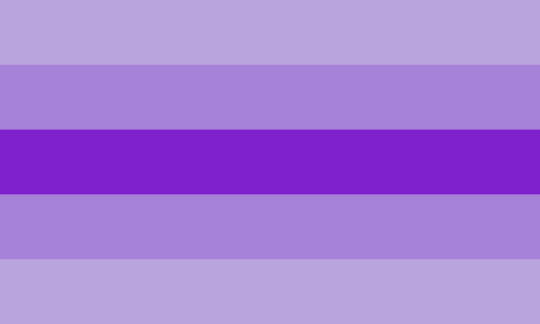
Transambiguity or transbiguity (adjectival: transbiguous, transbigue, transambigue, or tramsambiguous): a term used to describe a trans* individual who identifies fully or partially as ambigue or another ambiguous gender; transgender ambiguity/ambiguinity.
#transbiguine#transambiguine#ambiguine#ambigue#ambiguous gender#transambiguinity#transbiguinity#transambiguous#transbiguous#transambiguity#pride flag#gender ambiguity#mogai#liom#lgbt pride flags#transandrogynous#transdrogyne#transandrogyne#transdrogynous#mod ap#amingender#amin
88 notes
·
View notes
Note
could you do the ambiguish flag maybe? its fine if not
Yes, I absolutely can! Additionally, I apologize for the kerfuffle with me trying to find the right flag, and thank you for clarifying!
Note before we begin: This Magical Kid is an ambulatory wheelchair user with chronic leg and spine pain. I AM NOT PHYSICALLY DISABLED. I DO NOT USE A WHEELCHAIR. If any of this design or character are offensive or inaccurate, please tell me and I will fix it!

This Flag was requested by Anonymous!
Ambiguish is a term and flag coined by @ceduralshinji describing someone whose gender is ambiguous! This Magical Kid in particular uses it to mean Nonbinary, but whether or not it’s considered that way is up to the user!
This Magical Kid has a Mothman theme! They use They/Them pronouns!
Their name is Acherontia, based on the scientific name of the Death-Head Moth! They can see in the dark and from practically any range. Additionally, looking into their eyes will hypnotize you for five minutes!
Their Magical Kid Weapon is a Bug Net, which is especially useful for immobilize enemies and put them under their control!
A useless fact about them is that they’re actually scared of moths and butterflies- their mothman theme is just because they’re from Point Pleasent, Virginia- they’re scared to death of that motherfucker.
#the magical kid project#artists on tumblr#digital art#original art#pride flag#lgbt pride#lgbt#lgbtq#lgbtqia#nonbinary#ambiguish#gender ambiguity#disabled characters#character design#character
21 notes
·
View notes
Text

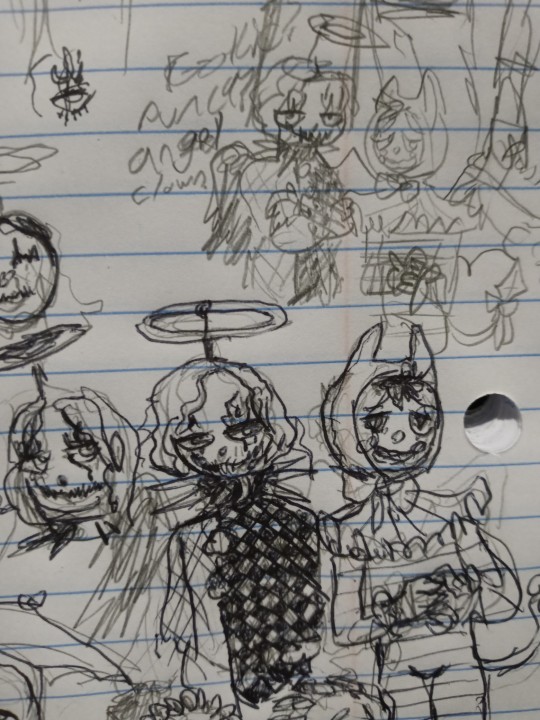

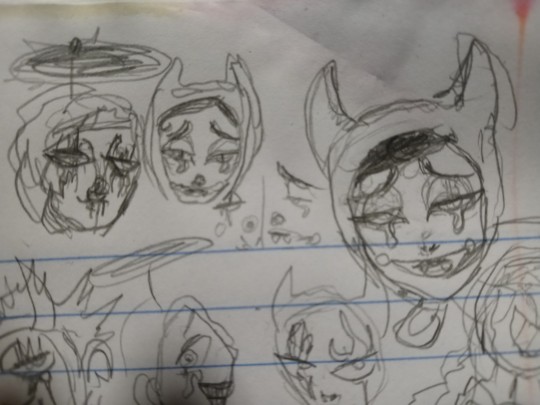
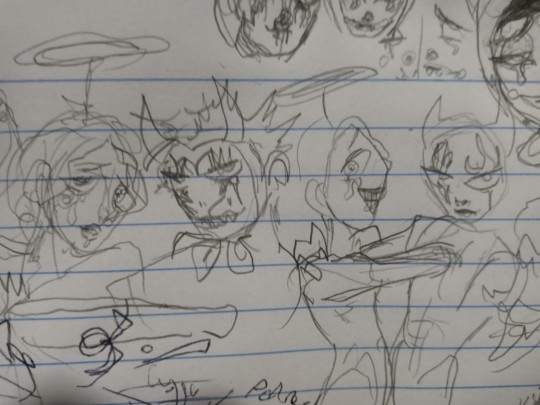
Clownmonth #13 Angel/Devil WIP, not quite done yet.
I started the Abstract one but this one was more fun.
#clown#clowncore#clown art#clowns#angelcore#devil character#devilcore#demon art#demon oc#angel art#angel oc#gender ambiguity#my digital art#my artwork#wip stuff#art wip#clown month 2023#clown month#sketch
23 notes
·
View notes
Text

I put my favourite characters togetehr for a thing on twt and I can’t stop laughing at this picture they are cut from the same cloth
#fave character criteria for me is like#white clothes#face or head covering#gender ambiguity#ambiguity of identity in general#lies and deception/illusions#connections to something divine
7 notes
·
View notes
Text
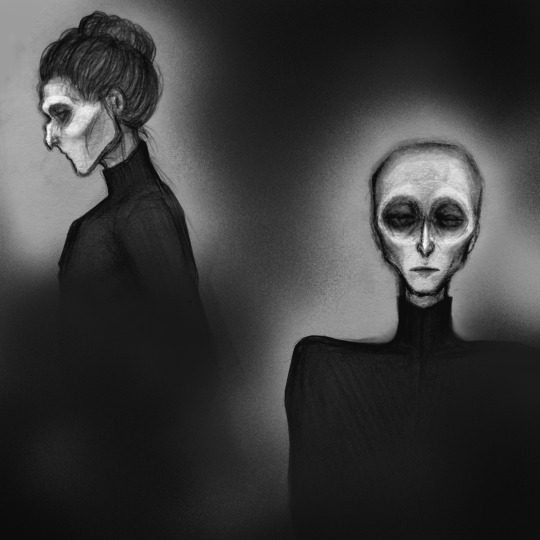
The hateful twist of rejection Bends my heart
—
I apparently can't not make my favourite characters a little queer..... Age 30-ish to Old and Sad years-old
#character concept#uldred#dragon age origins#precanon#my obsession for him endures#dragon age#queer people#gender ambiguity#lyrics: lilac & violet - gavin dunne#pronouns are her/majesty#he definitely corrects people calling him by his name with 'it's Mistress for you'#traditional art#digital editing
7 notes
·
View notes
Text
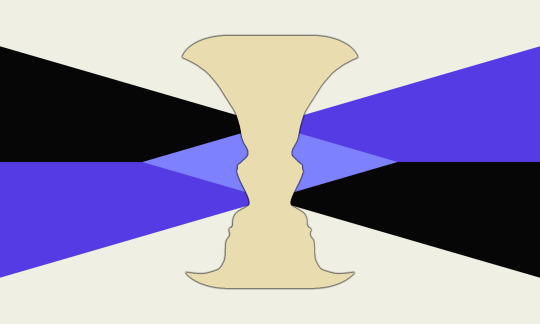
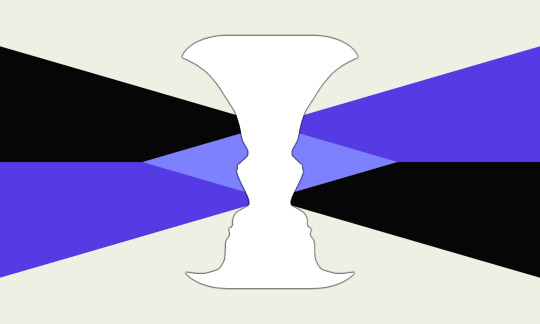
(More) Alt. Ambigue flags
These use my alternate Ambigue flag seen here, but with a different symbol
The Penrose Triangle (also called the Impossible Triangle) is now replaced with another optical illusion (or ambiguous image) called Rubin's Vase/Face.
Two different colors for the vase are present because I couldn't decide which was better
Help with Image IDs and ALT text is appreciated!
#ambigue#gender ambiguity#ambiguous#mogai flag#mogai flags#liom flags#liom flag#mogai community#liom community#mogai safe#liom safe#mogaireal#liomreal#mogai friendly#liom friendly
6 notes
·
View notes
Text

I saw the most beautiful person, but I just couldn't talk to them. I know I'll never see them again, but I swear, something must've chemically changed in my brain. Glass Animals's songs ring harder in my ears. Love feels like a thing that exists in a million more ways. I may be infatuated. I welcome this longing.
#tw smoking#bisexual lighting#gender ambiguity#I literally couldn't tell their gender#that's kinda hot tho#gender noncomformity#ambiguous gender#art#artists on tumblr#my art#digital art#artwork#made with krita#origional art
5 notes
·
View notes
Note
Hi
I made the neuter flag in the same way someone coined positive and negative, or "neither".
But outside this context, these words have other meanings and are used in other contexts as well, including when you associate them with gender (e.g. neither agender or aporagender)
I'm pretty sure people self-identified as neuter before I "defined"/"coined" it.
Now, let me *invoke this special summon carding in the defense position*:
https://www.tumblr.com/isobug/754613985064665088/polysemous-identity-polysemy-flags-polysemous
Neuter is used in grammar in some languages. for example, it/its is originally a neuter pronoun (in the same way she and he are feminine and masculine). I'm not sure how the TGNC community deals with it in the Anglosphere, as I see people saying pronouns don't have gender but I have yet to see people saying pronouns don't have grammatical gender anymore, but where I live, people are shifting language from calling them fem/masc to say marked/unspecific genders, and neuter is a "patterned alternative gender system" (it's mostly neolingual here).
It's common to see neutered being associated with animal castration (more or less how neutrois was defined prior to 2010s, you could even see the terms MtN or FtN associated with nullo surgeries).
But my intention was to refer to it as a gender. I would personally define it as a gender that is parallel towards feminine or masculine and/or parallel of female or male, depending on the context.
I think the word parallel defines it better, even though sometimes it can have vacillancy or ambiguity.
However, languages such as Swedish have neuter (neutrum) but no masculine or feminine gender, and the other gender is common (utrum), in this case, neuter is usually inanimate (or nonhuman or even nonanimal). neuter could also be the opposite of alteruter (alterutrum), so it could be a static gender.
So I can see how this could otherize/feel othering to some too
This was very informative! Thank you for taking the time to reach out and send me all this information.
The polysemous link is broken. The link to the blog is isobug.tumblr.com, not tumblr.com/isobug, so maybe that's where it's getting confused. I changed the way the URL redirects and so this is actually the link to that post.
But anyway, I appreciate all the information. I remember seeing how neuter is a grammatical gender term but I like that it's also a personal gender term (literal gender term? I'm not sure how to differentiate grammatical gender from the gender an individual actually uses.) - 💙💚
1 note
·
View note
Text
From my perspective as a U.S. resident, clothes (and toys) for kids are far more aggressively gendered now than they were in the 70s and 80s, too. I've heard a variety of theories as to why, including increased focus on gendered baby clothes as family size shrank and prenatal gender determination became available - the idea being that companies selling more strongly gendered clothes would be able to sell twice as many to a family with a boy and a girl. Yes, there was still gender segregation in marketing of toys and clothes then, but it was less intense.
Another, complementary, theory - this one my own, though I am sure others have thought of it as well - is that, as gender roles in the U.S. (and elsewhere) have begun to be more fluid - men can be stay-at-home parents; women can be heads of households; queer people more visibly explore gender expression in a variety of ways - there is an aspect of social backlash to the increasing acceptance of gender ambiguity that manifests itself in increasingly restrictive channels for self-expression within a gender binary.
Basically, men can't be counted on to act "like men", nor women "like women", like in the "good old days"; and queer people are actually visible in many or most parts of society; so people - mostly men - who want to demonstrate conformity with the gender binary or performative heterosexuality have to avoid any hint of self-expression in their dress or mannerisms.
I'm not sure how the lack of color in decorating, products, et cetera ties in to this but it's an interesting avenue to explore, as well.
still so fucking weird to go from real life, where a cis man being flamboyant/effeminate/camp is judged like 70+% by how he speaks and carries himself, to online queer communities, which often seem to have no concept of male gender non-conformity that doesn’t involve wearing a skirt
101K notes
·
View notes
Text
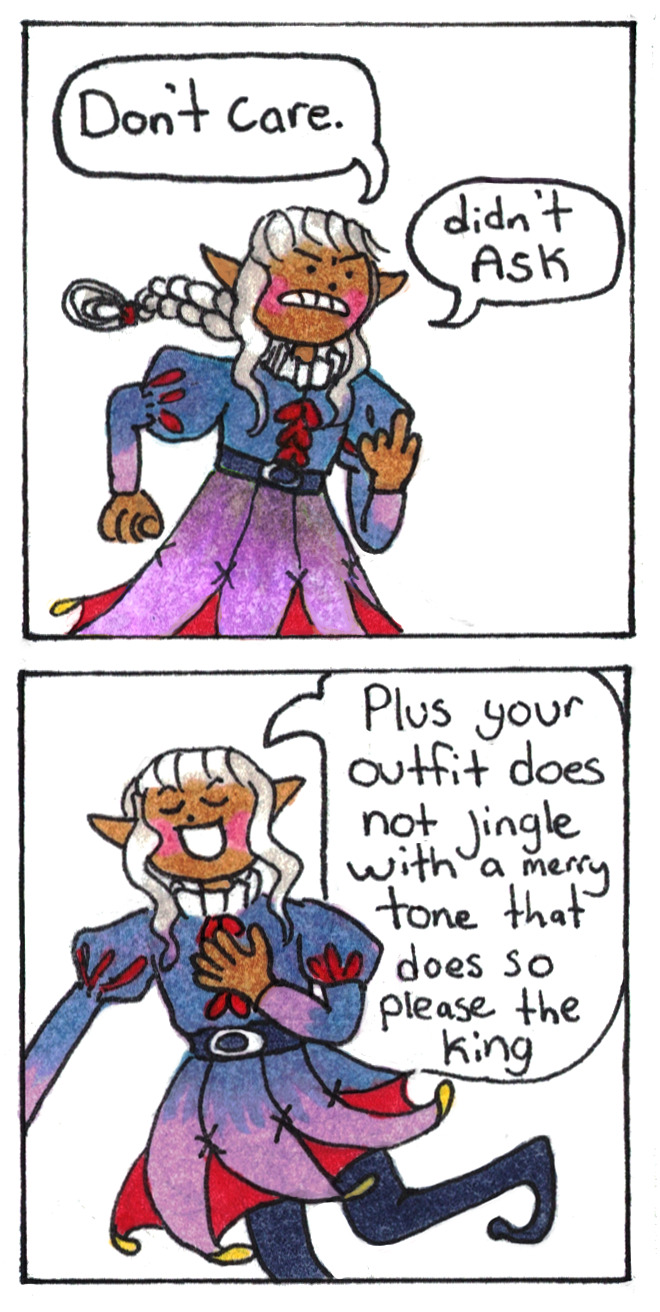
Happy Thistle Debut Day!
#dungeon meshi#Thistle#Old dungeon meshi fans remember the days when it was ambiguous what gender Thistle was.#Now we know Thistle uses he/him pronouns but in my heart Thistle is still non-binary. Clowngender elf with poor coping skills.#I hope the anime-only watchers know that this is a character to keep an eye on.#Love (in it's many forms) and desire (in it's many forms) is the main course of Dungeon Meshi and THIS silly jester?#My goodness. What a perfect encapsulation of how one can hurt other's so deeply in the name of love.#The actions we take to 'protect' other's is often the route to doing the most harm.#Love is letting go. Sometimes that means control and sometimes that means saying farewell forever to someone.
6K notes
·
View notes
Text
Jason blinked in surprise at the image that had been added to their groupchat. He recognized that face. In fact, you could say he knew it very intimately now.
After debating for a moment, he sent a reply. “I think I may have found ‘em”
“Do you still have a visual?”
Jason’s gaze flicked to the figure. Still asleep in bed next to him.
“…yes”
#anger management ship#or could be#dead on main ship#i tried to leave it ambiguous by avoiding gendered language#yep. Jason slept with their suspect.#he can never let the rest of the bats know. they’d never let him live this down.#dp x dc#dpxdc#dc x dp#dcxdp#danny phantom x dc crossover#dp x dc prompt#dpxdc prompt#dc x dp prompt#dcxdp prompt
2K notes
·
View notes
Text

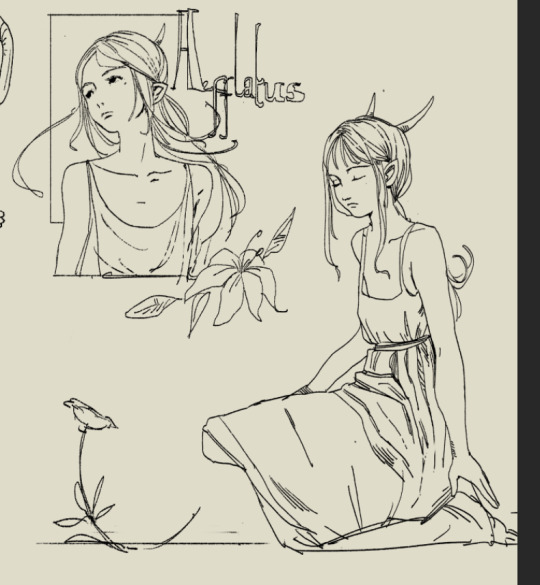
style test, thank you lilou
#my art#li-lou-yanna#ffxiv#..BARELY ATP#mine#something clicked while drawing this i think lils strain of gender ambiguity is way more old fashioned#-androgynous storybook prince than it is like. i dont know. astolfo#he's sort of sexless like a. gnome
2K notes
·
View notes
Text

someone said ftm crocker and i
#homestuck#jane crocker#jake english#art#i endorse the thought#i think jock crocker#or the gender ambiguous jrocker#jegbert works rly well#jrocker is just fun to say#in my head
623 notes
·
View notes